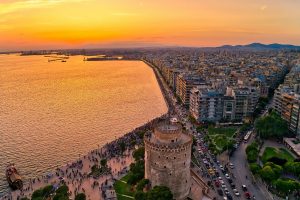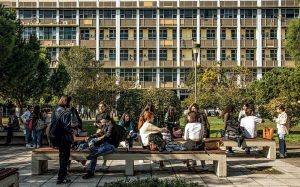 STUDYING IN THESSALONIKI
STUDYING IN THESSALONIKI
Thessaloniki is the second-largest city in Greece, the capital of the region of Greek Macedonia and a Metropolis in the Balkan Peninsula. Situated in the Gulf of Thermaikos on the Aegean Sea, the city is well known for its historical heritage, natural beauty, unrivalled sea view, but mostly for its youthful and upbeat flavour. With a population of 1.3 million, Thessaloniki has kept its friendly and laid-back character, making it an ideal student destination, easy to settle in and get around. Whatever your style is, this city will charm you with its rich cultural life, its large number of monuments, its exquisite cuisine, the vivid nightlife and beautiful surroundings.
Thessaloniki’s history spans over 2300 years. The city was founded around 315 BC by King Cassander of Macedon. An important metropolis in the Roman period, Thessaloniki was the second largest and wealthiest city of the Byzantine Empire. It is a beautiful city built between the sea and the mountain. The architecture is the direct result of the city’s position at the centre of all historical developments in the South East Europe. The Byzantine Churches, the White Tower, several Roman and Ottoman remains and the Upper City are only some of the sites that enhance Thessaloniki’s charm.
Thessaloniki is a modern European city. However it has relatively low cost of living and can satisfy the needs of students’ budget. Key crossroad between east and west, Thessaloniki since its establishment, 2300 years ago, has always been a diverse and multicultural city. Today, with students from all over the world the city celebrates its diversity and international character. Though a big city, Thessaloniki has kept its friendly character and is considered one of the safest cities to study in.
Life in Thessaloniki can never be boring. With Aristotle University being the biggest one in Greece, the most energetic student population and its lively youth, the city remains vibrant by day and night. Fabulous cafes, sizzling night life, bars, concerts and performances make student life in Thessaloniki even more exciting! For more information you can visit http://www.inthessaloniki.com/en/quick-guide and relevant sites.
Thessaloniki’s immediate surroundings include Chalkidiki’s unique sandy beaches and seaside resorts as well as beautiful mountains, lakes, and natural preservation areas that students choose for their excursions.
 STUDENT ACCOMODATION
STUDENT ACCOMODATION

